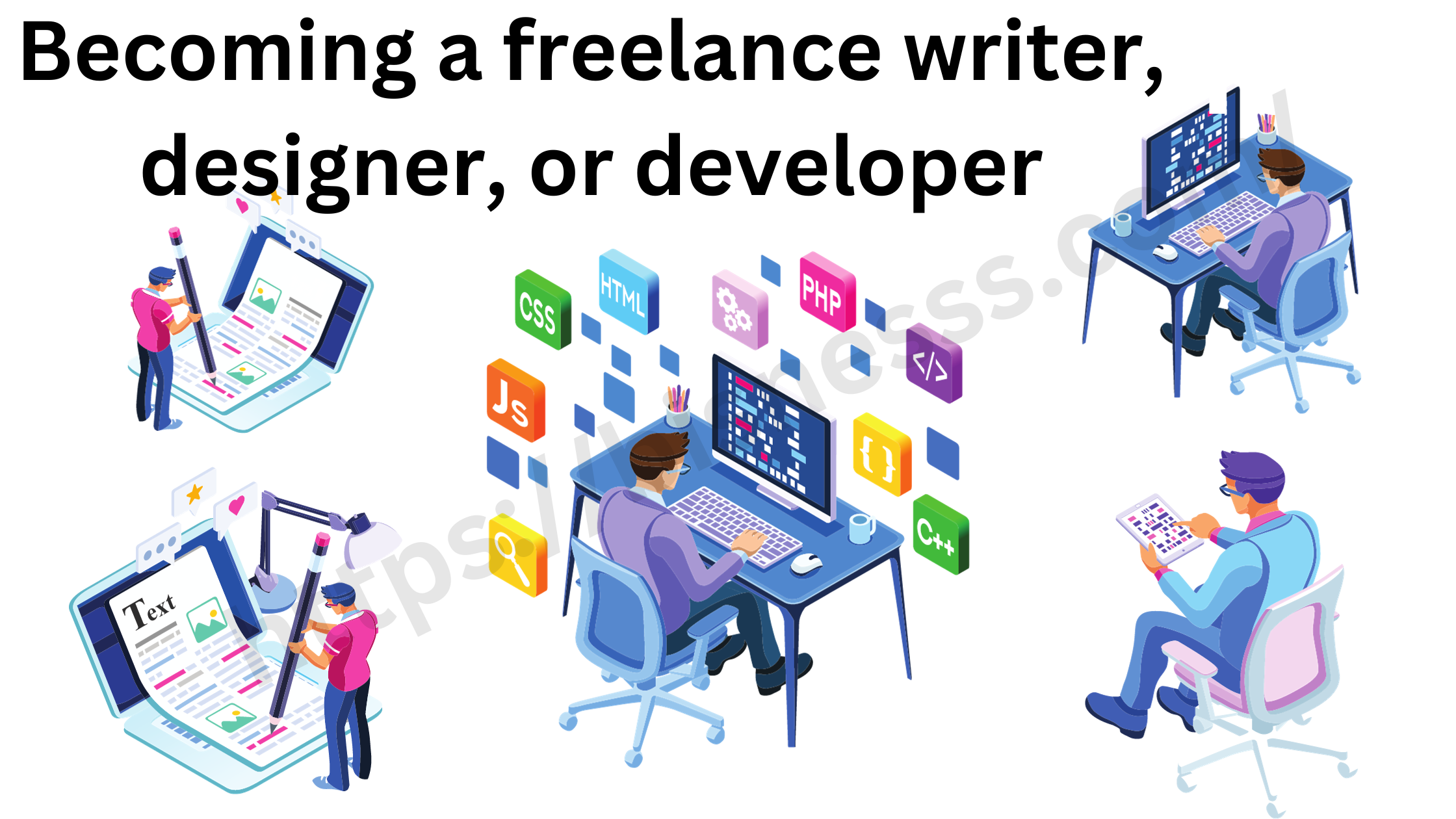Becoming a freelance writer, designer or developer is a path that many individuals choose to take in today’s digital age. The rise of remote work and the gig economy has opened up numerous opportunities for talented professionals to offer their services independently. This shift has empowered creative minds to carve their own niche, set their own schedules, and take control of their careers. In this exploration, we’ll delve into the dynamics of freelance work in these three domains and highlight key aspects of establishing a successful freelance business.

Freelance Writing: Crafting Words for Impact
1. Building Your Portfolio:
A freelance writing business begins with a strong portfolio. Potential clients often assess your previous work to gauge your writing style, tone, and expertise. Create a diverse portfolio showcasing a range of writing samples, from blog posts and articles to product descriptions and press releases. This not only demonstrates your versatility but also serves as a testament to your skills.
2. Niche Specialization:
Identify and specialize in a particular niche. Whether it’s technology, finance, health, or lifestyle, having a focused expertise can make you stand out in a crowded market. Clients are more likely to hire a specialist who understands the intricacies of their industry and can deliver content tailored to their audience.
3. Marketing and Networking:
Successful freelancers understand the importance of marketing themselves effectively. Utilize online platforms like LinkedIn, Upwork, and Fiverr to showcase your skills and connect with potential clients. Actively participate in relevant forums, engage in social media discussions, and attend networking events to expand your reach.
4. Setting Rates and Contracts:
Determining your rates is a critical aspect of freelance writing. Consider factors such as your experience, the complexity of the project, and industry standards when setting your prices. Clearly outline your terms and conditions in contracts to avoid misunderstandings and ensure a smooth client relationship.
5. Time Management:
Freelancers often juggle multiple projects simultaneously. Effective time management is crucial for meeting deadlines and maintaining a steady workflow. Utilize tools like project management software, time-tracking apps, and calendars to stay organized and deliver quality work on time.
Freelance Design: Creativity in Every Pixel
1. Portfolio Presentation: For freelance designers, a captivating portfolio is the key to attracting clients. Showcase a diverse range of projects that highlight your design skills across different mediums—whether it’s web design, branding, or graphic design. Ensure that your portfolio reflects your unique style and creative vision.
2. Software Proficiency: Stay updated on the latest design tools and software. Whether it’s Adobe Creative Suite, Sketch, or Figma, proficiency in industry-standard software is essential for delivering high-quality designs. Continuous learning and adaptation to new technologies will keep your skills relevant.
3. Client Collaboration: Clear communication with clients is paramount in freelance design. Understanding their vision, providing regular updates, and incorporating feedback are essential for a successful collaboration. Develop good interpersonal skills to ensure a positive client-designer relationship.
4. Pricing Strategies: Freelance designers employ various pricing models, including hourly rates, project-based fees, or a combination of both. Consider factors such as project complexity, your level of expertise, and the client’s budget when determining your pricing structure. Transparent communication about costs upfront helps build trust with clients.
5. Branding and Marketing: Build a personal brand as a freelance designer. A well-designed website and a strong social media presence can significantly enhance your visibility. Participate in design communities, share your insights, and leverage platforms like Behance and Dribbble to showcase your work to a wider audience.
Freelance Development: Coding Your Path to Success
1. Technical Skills: For freelance developers, staying abreast of the latest programming languages, frameworks, and technologies is crucial. Continuous learning is inherent in the rapidly evolving field of web and software development. Specializing in specific technologies can make you more appealing to clients seeking expertise in those areas.
2. Building a GitHub Portfolio: Create a robust GitHub portfolio to showcase your coding skills. Share your open-source contributions, personal projects, and code samples. A well-maintained GitHub profile serves as a living resume, demonstrating your coding proficiency and collaborative work.
3. Client Communication: Effective communication is key in freelance development. Clients may not have technical backgrounds, so the ability to explain complex concepts in layman’s terms is valuable. Regular updates, clear documentation, and responsiveness contribute to a positive client experience.
4. Freelance Platforms and Networking: Join freelancing platforms like Upwork, Freelancer, or Toptal to connect with potential clients. Networking within the developer community through forums, meetups, and conferences can also lead to valuable opportunities. Building a professional network can result in referrals and long-term collaborations.
5. Security and Code Ownership: Discuss and clarify issues related to code ownership and security with clients. Establish clear terms in contracts to address these aspects and ensure that both parties are aligned on issues such as intellectual property rights and data security.
Challenges and Rewards of Freelancing:
While freelancing offers flexibility and autonomy, it comes with its own set of challenges. Irregular income, the need for self-discipline, and the responsibility of managing administrative tasks are common hurdles. However, the rewards of freelancing, such as the ability to choose your projects, work from anywhere, and set your rates, often outweigh the challenges.
In conclusion, whether you choose to become a freelance writer, designer, or developer, success in the freelance world requires a combination of skill, business acumen, and effective self-management. Building a strong online presence, marketing your services, and consistently delivering high-quality work are fundamental to thriving in the competitive freelance landscape. By embracing these principles and continuously honing your craft, you can carve a fulfilling and prosperous career as an independent professional in the dynamic world of freelancing.
Guide to Creating a Business Plan With Template

